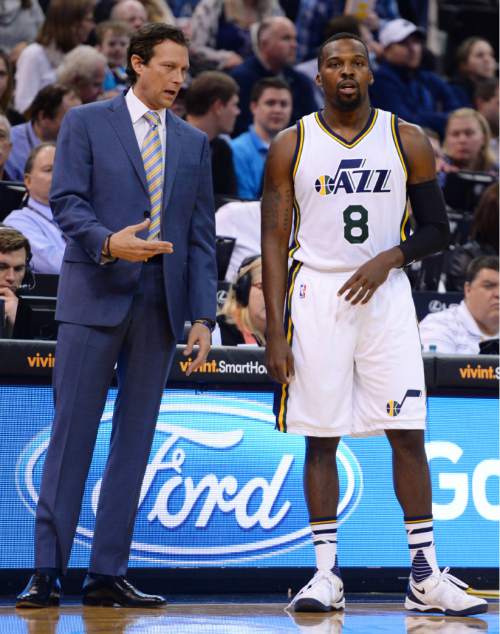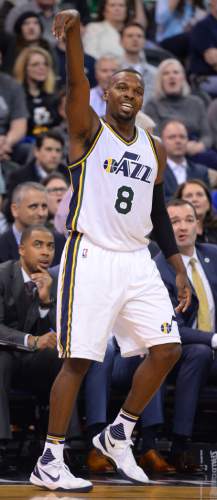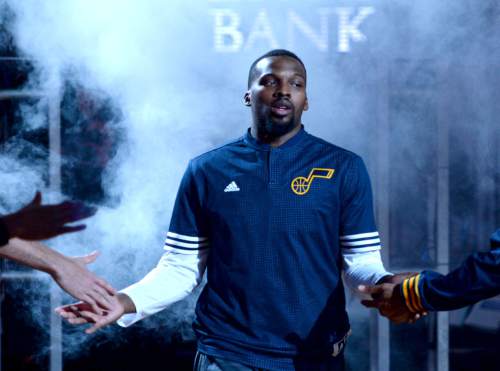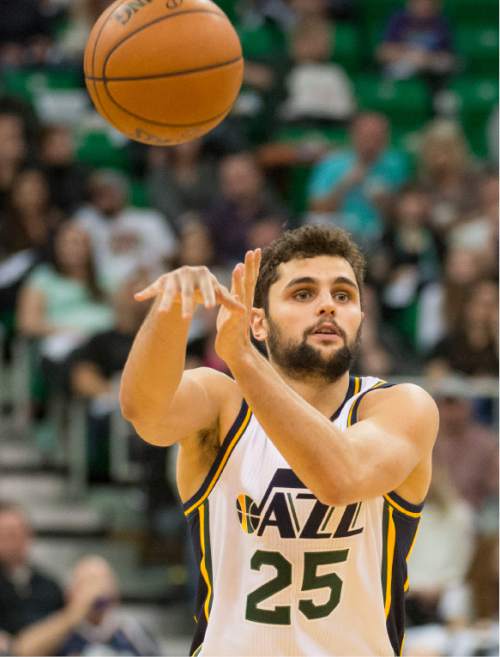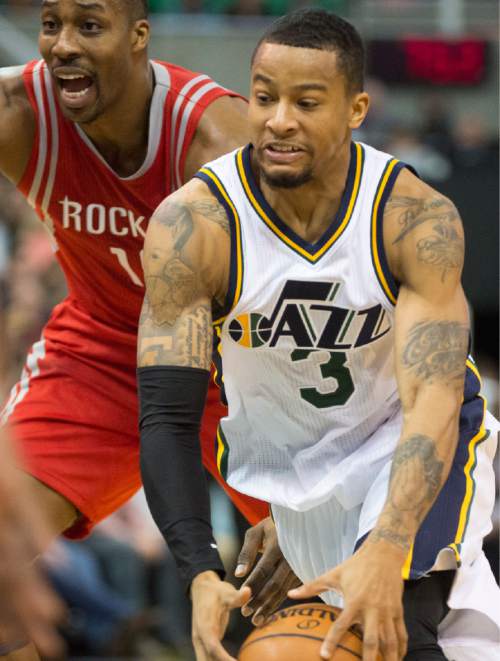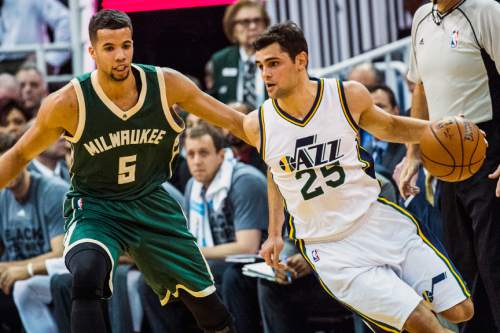This is an archived article that was published on sltrib.com in 2016, and information in the article may be outdated. It is provided only for personal research purposes and may not be reprinted.
It wasn't that long ago that the Utah Jazz were rolling, although it may seem like ages now. They had won seven of their final eight games leading up to the All-Star break and sat in playoff position (with dreams of climbing a spot, or two, or three!) as they parted for their midseason vacation.
Take a minute. Sigh, exasperated. You know what comes next.
On this side of the break, the Jazz have reacquainted themselves with how the other half lives. They have dropped seven of their past nine, an uninspiring stretch that has them two and a half games out of a playoff spot with a month left in the season.
"What happened?" you ask yourself. "What changed?"
Then you run your finger down the box score until it stops on the only name that wasn't there before: Shelvin Mack.
It was a year ago that a deal at the trade deadline (so long, Enes Kanter) helped spark the Jazz's second-half surge, a push to the finish line that turned them into a darling sleeper pick to join the West's playoff club. But this year, an 11th-hour transaction netted the Jazz a new starting point guard. A slump followed. Now the Jazz aren't sleepers; they're trying to pick themselves up off their postseason deathbed.
Mack then becomes an easy scapegoat, but assigning him the blame for the Jazz's recent struggles is unfair when the team's problems are myriad.
"That's just a faulty analysis, to be honest," Jazz coach Quin Snyder said.
Fitting in
Of course such a sudden change to a starting lineup has impacted a delicate ecosystem. Although there are similarities between the way the Hawks and Jazz play, Mack is learning a new system on the fly and his teammates are learning his tendencies, too.
Mack's arrival has coincided with a dip in production for shooting guard Rodney Hood. Since returning from the break, Hood has been dealing with a back injury which has caused him trouble on the court, but there's no question that Mack's extended time with the ball in his hands has reduced some of Hood's opportunities with the starters.
"I've got to find other ways to be aggressive, especially with that first group," Hood said. "... It was me and Fav [Derrick Favors] and Gordon [Hayward], and Shelvin's being aggressive. I just have to be really aggressive with the second group."
Mack's ability to get to the rim, meanwhile, set him apart from point guards Trey Burke and Raul Neto from the outset. But when Mack is not making shots — and there have been games where he has struggled — defenses can go under screens and sag into the paint, taking away the pocket pass the Jazz love to throw in their pick-and-roll action, making life more difficult. The Jazz will hope that Mack has busted out of his shooting slump after going for a career-high 27 points in Friday's win over the Wizards.
Ball security
Turnovers have hurt the Jazz all season and Mack's arrival hasn't brought a cure. The Jazz have the worst turnover ratio in the NBA since the All-Star break — and Mack has the third-highest turnover ratio on the roster, as he tries to learn the tendencies of his new teammates.
At times, Mack finds himself in the limbo between lobbing to Jazz center Rudy Gobert or taking the floater for himself. Other times, Mack (and he hasn't been the only Jazzman guilty of this) bounces a pass too low for the 7-footer to handle. In Atlanta, Mack played with predominantly pick-and-pop big men and is having to adjust to the skillsets of Gobert and Favors. Still, Mack has twice notched eight-assist games, something no other Jazz point guard had done this year.
"It just takes time," Mack said Friday. "I think it's been 14 days or so. It just takes time and getting familiar with everyone on the team. Everyone is giving me confidence and just continue to keep pushing at it."
Calling for backup
Having played with him for two seasons at Butler, Hayward knows Mack better than any other player on the court. Asked this week how he felt his former college teammate was fitting in, Hayward offered this review: "I think you can see the chemistry is there sometimes. We're getting double-digit leads early in the game. It's just a little stagnant later on. We have a lapse for whatever reason, turnovers happen, we're not making shots. Then all of a sudden our lead's gone and we're in a dog fight."
You could point the finger at the Jazz's bench for that.
In the 134 minutes they've played together, the Jazz starters are outscoring opponents by 12.3 points per 100 possessions, a fabulous number. Mack, meanwhile, is one of three rotation Jazzmen with a positive plus-minus number since the All-Star break.
But the Jazz's depth, or lack thereof, has been apparent. Chris Johnson and Joe Ingles have had to play heavier minutes than anyone anticipated entering the year and the Jazz desperately need a healthy Alec Burks during this playoff push.
Shedule losses
Another factor that cannot be overlooked has been their schedule. Their seven-game win streak before the All-Star break left everyone feeling good, but the Jazz played five of those games at home. And while overtime wins against the Bulls and Mavericks were solid victories, the Jazz didn't face the level of competition in that stretch that they have seen recently. Yes, last month's home defeat to the Brooklyn Nets was an awful loss. But a home loss to San Antonio and road losses at Boston, Toronto and Golden State were almost expected.
The Jazz, however, will likely to need to win a few games in which they're not favored if they intend to crack the postseason.
In defense
Mack doesn't have great quickness or athleticism, but his size — 6-foot-3 and 210 pounds — made him an attractive piece for a Jazz team playing with two undersized point guards. Snyder hoped Mack would help them slow down the league's bigger, faster guards. So far, he hasn't had much luck.
Perhaps that's to be expected. Mack was the third-stringer in Atlanta. Was he really expected to shut down Toronto's Kyle Lowry or Atlanta's Jeff Teague, the man he backed up before coming to Utah?
"He has not been a starter in the NBA," Snyder said. "He's been the third point guard in Atlanta. That's not a knock on Shelvin. We traded for him because he's solid and we thought he could help us. I think he has. That doesn't necessarily always equate to wins. I don't think that's fair to put that on him."
It would be too much to expect Mack to be the savior of a team with so many holes, and too simple to say he has derailed their playoff chances.
Twitter: @tribjazz —
Jazz at Kings
P At Sleep Train Arena (Sacramento, Calif.)
Tipoff • Sunday, 4 p.m.
TV • ROOT
Radio • 1280 AM, 97.5 FM
About the Jazz • Got a much-needed home win Friday night against the Washington Wizards behind a career-high 27 points from Shelvin Mack. … Trail the Dallas Mavericks by 2.5 games for eighth place in the West. … Held the Wizards to six fast-break points and will need to double down on transition defense to slow down a Kings team that loves to get out and run.
About the Kings • Have won three straight contests against the Jazz going back to Feb. 7, 2015. … Leading scorer DeMarcus Cousins will be back after serving a one-game suspension for "conduct detrimental to the team" … George Karl's crew plays at the fastest pace in the NBA.


